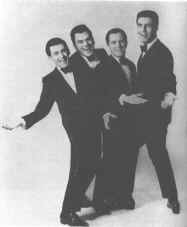

Life in the fast lane came to an abrupt halt for
the Four Seasons in 1968 with the release of Genuine
Imitation Life Gazette. Having strayed from their heretofore
surefire formula to produce what has been called the group's
attempt at a "relevant" or progressive album, the Four
Seasons were faced with their first monumental failure. It was
around this time that Bob Crew ended his association with Valli
and company, Gaudio assuming the role of producer. Further
difficulties loomed when the strain of constant touring,
compounded by litigation with Philips Records, pitted the Seasons
against one another. In 1970, Philips released Half and Half,
featuring the single "Patch of Blue," which rose only
as high as Number 94.
For several years the group languished without a label, until
they joined Mo-West, Motown's subsidiary on the West Coast. And
with the exception of the 1972 Mo-West album Chameleon, the Four
Seasons did not record together again until 1975. Valli, however,
made a solo comeback in 1974 with the mellow number "My Eyes
Adored You," a Number One hit that was eventually certified
double platinum. Two more singles, 1975's "Swearin' to
God" and "Our Day Will Come," solidified his
return to the limelight.
In 1975 the Four Seasons united to record the Warner Bros.
release "Who Loves You," co-written by Gaudio, which
pushed them back into the Top Ten. The following year, they went
all the way to Number One--for the first time in over a
decade--with the infectious coming-of-age ditty "December
1963 (Oh What a Night)," also co-penned by Gaudio.
Valli continued to record with the Four Seasons
until their breakup in 1977. He also concentrated on his solo act
but did not score another significant success until 1978. With
the release of Grease, the soundtrack of the
phenomenally popular movie for which Valli sang the title track,
some of his lost audience was reclaimed and a whole new crowd of
swooning teenagers won over. The film, which was set in the 1950s
and starred Olivia Newton-John and John Travolta, also provided
Valli with a bit of acting experience--in a cameo role playing
himself. Many of the album's songs were written by Bee Gee Barry
Gibb, which undoubtedly helped the disc soar to its Number One
position during the height of the disco era, created in part by
the Bee Gee's record-selling soundtrack to Saturday Night Fever.
Valli was at the zenith of his career with a triple-platinum hit.
The following decade saw Valli and Guadio re-formed The Four
Seasons in 1980 and formed FBI Records in 1984. They also
recorded and occasionally toured with a new Four Seasons, by this
time comprised of six members.
Many of the original group's best-known songs became standard fare for club and concert performances.
1992 found Valli working on a new solo album as
well as promoting the Four Seasons disc Hope and Glory.
Frankie Valli and the Four Seasons were recognized in 1990 for
their impact on popular music with induction into the Rock and
Roll Hall of Fame alongside other classic acts such as The Who
and the Four Tops. Considering his still-driving energy, it
seemed likely that Valli's famous falsetto would delight
listeners for another 30 years.
The Four Seasons were inducted into the Rock and
Roll Hall of Fame in 1990.
The Four Seasons were inducted into the Vocal
Group Hall of Fame in 1999.
Tommy DeVito passed away in Nevada September 21,
2020 at the age of 92. He had recently been hospitalied after
contacting COVID-19.
Nick Massi passed away from cancer December 24, 2000, at his home
in West Orange, New Jersey.
![]()